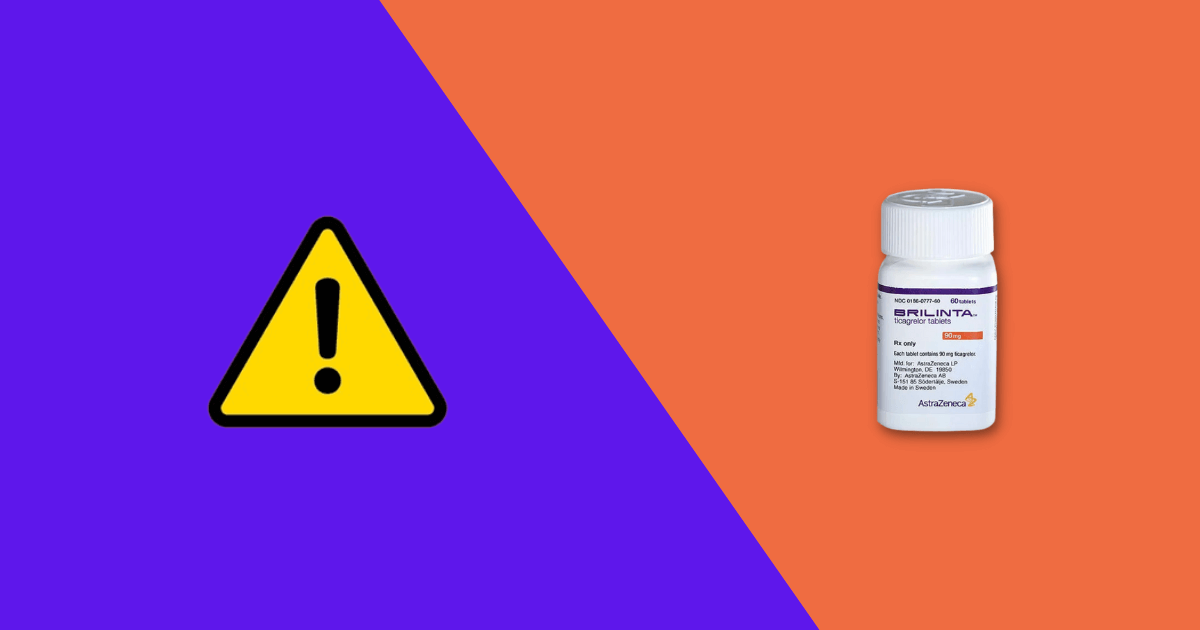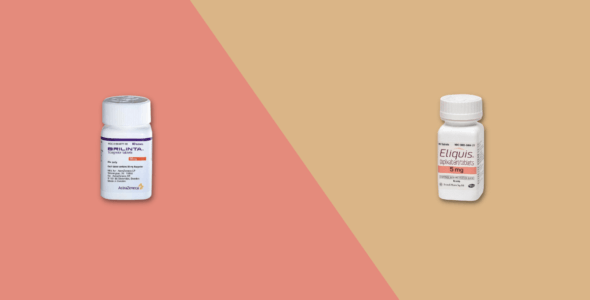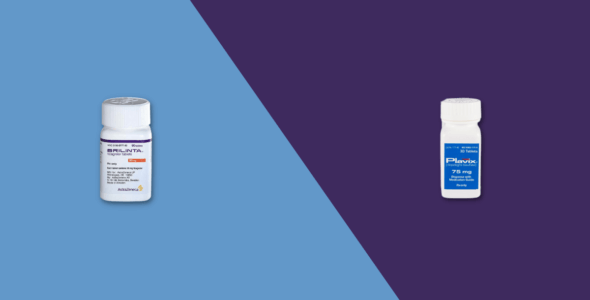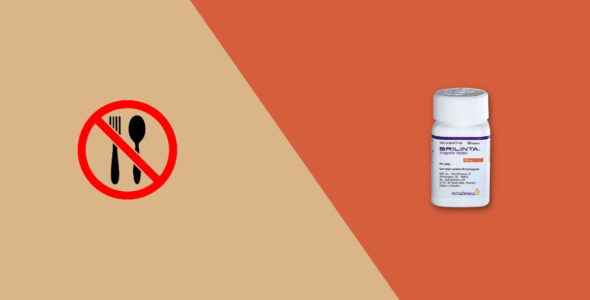Brilinta side effects and how to avoid them
Table of contents
Brilinta is a brand-name medication manufactured by AstraZeneca. It is classed as an antiplatelet and is used to reduce the risk of heart attacks and strokes. While Brilinta is generally well tolerated, there are some potential side effects that people should be aware of. The most common side effects of Brilinta include an increased risk of bleeding. Less common, but more serious side effects, can include serious allergic reactions.
Learn more about the side effects of Brilinta and what you can do to avoid them.
What is Brilinta (ticagrelor)?
Brilinta is an FDA (U.S. Food and Drug Administration) approved medication used to reduce the risk of heart attacks, strokes, and death from heart disease caused by blood clots blocking blood vessels. It’s prescribed to adults who:
- Have previously had a heart attack (myocardial infarction)
- Have coronary artery disease (CAD) and are at a high risk of having a heart attack or a stroke
- Have acute coronary syndrome (ACS), which occurs when blood flow to the heart is suddenly blocked
- Have ACS and who have been treated with a stent
If you have CAD, ACS, or have a stent due to ACS, you may be at a higher risk of blood clots. Brilinta helps to stop your blood clotting, reducing your risk of a heart attack or stroke. The active ingredient in Brilinta, ticagrelor, inhibits platelet activation by binding to receptors on the surface of your platelets. This stops them from being able to stick together preventing the process that causes clotting.
Brilinta dosage
Brilinta is available in tablet form, in the following doses: 60 mg and 90 mg tablets. Your loading dose and maintenance dose will be based on the condition you are being treated for.
When Brilinta is prescribed for lowering the risk of stroke in people having an ischemic stroke or a transient ischemic attack, a loading dose of aspirin is also given. The combination of aspirin and a P2Y12 inhibitor such as Brilinta is called dual antiplatelet therapy (DAPT). If you miss a dose of Brilinta, skip the missed dose and take your next dose at the usual time. Do not double your doses.
You will take Brilinta for at least 12 months after stent placement. After the first 12 months, you will take Brilinta for a further 12 months at a reduced dose. Your doctor will decide your dose at your follow-up appointment to determine any changes.
You are advised to read the prescribing information and medication guide provided with this medicine and to speak with your healthcare provider for medical advice about any changes to your dose so they can monitor and evaluate your condition.
Brilinta side effects
The most common possible side effects of Brilinta include:
- An increase in minor bleeding risk, including nosebleeds and bruising
- Shortness of breath (dyspnea)
- Dizziness
- Feeling sick (nausea)
Brilinta can cause more serious side effects, including:
- Increased risk of bleeding such as serious internal and external bleeding that could potentially be fatal. Symptoms of serious bleeding may include bloody or black stools, red or brown urine, coughing up blood or vomit that looks like coffee grounds
- Heart problems such as changes in heart rhythm, or abnormally slow heart rate
- Life-threatening allergic reactions to the medication that could cause swelling in your face, mouth, or throat, chest pain (angina), heart palpitations, or trouble breathing
If you experience any of these serious side effects, stop taking Brilinta and seek medical attention immediately. You are encouraged to report negative side effects of prescription drugs to the FDA. Visit www.fda.gov/medwatch, or call 1-800-FDA-1088.
Brilinta drug interactions
Brilinta can interact with other medications including:
- Any medications taken to treat heart conditions or high blood pressure
- Digoxin
- Treatments for high cholesterol – lovastatin, simvastatin
- Any blood thinner (anticoagulant) medications taken to reduce your risk of blood clots – clopidogrel, heparin, warfarin
- Any pain killers – codeine, ibuprofen
- Antidepressants – nefazodone
- Any antibiotics – erythromycin, rifampin, clarithromycin
- Any medications taken to treat HIV/AIDS – ritonavir, atazanavir
- Antifungal medicines – itraconazole, ketoconazole
- Any anti-seizure medications – carbamazepine, phenobarbital, phenytoin
Before taking Brilinta, be sure to tell your doctor about all of the medications you are taking to ensure they are safe to take at the same time.
Brilinta warnings & precautions
You should not use Brilinta if you:
- Are allergic to the active ingredient ticagrelor
- Are allergic to any of the other ingredients in Brilinta
- Have ever had bleeding in your brain
- Are currently bleeding
Talk to your doctor before using Brilinta if you:
- Have ever had a stroke
- Have ever had any problems with bleeding
- Have ever had stomach ulcers or colon polyps
- Have any liver problems
- Have asthma or chronic obstructive pulmonary disease (COPD)
- Have recently had surgery or a serious injury
- Are planning to have surgery or a dental procedure
- Are pregnant or are planning to become pregnant
- Are breastfeeding or are planning to breastfeed
You should always check with your doctor or pharmacist before taking any medication, including Brilinta, to make sure it is safe for you.
Other warnings you should know about
Ticagrelor may increase the risk of serious bleeding during surgery, or other medical procedures such as coronary artery bypass graft (CABG), or dental work. Stop using Brilinta at least 5 days before surgery, medical procedure, or dental work.
How to avoid Brilinta side effects
The best way to avoid side effects is to take Brilinta as directed by your doctor. Follow your doctor’s instructions carefully and do not take more or less than prescribed.
If you experience any side effects, talk to your doctor or pharmacist. They may be able to recommend ways to help reduce or prevent some of the side effects.
1. Stick to the recommended dosage
Take your prescribed dose of Brilinta that has been recommended by your healthcare professional. Do not take more or less than prescribed.
2. Monitor your blood sugar levels
If you have diabetes, it is important to monitor your blood sugar levels closely while taking Brilinta. Check your blood sugar levels as directed by your doctor and report any changes to your doctor immediately.
3. Drink plenty of fluids
Drink eight to 10 glasses of water or fluids every day to help prevent dehydration, which can make side effects worse.
4. Avoid alcohol
Avoid drinking alcohol while taking Brilinta as you will also be taking aspirin which can increase your risk of stomach bleeds and ulcers.
5. Don’t skip meals
Eating regular meals and snacks will help to prevent low blood sugar levels (hypoglycemia).
6. Check your feet
If you have diabetes, check your feet for any cuts, sores, or redness regularly. Tell your doctor if you experience any problems with your feet while taking Brilinta.
7. Know the signs and symptoms of Brilinta side effects
Signs and symptoms of side effects include an increased risk of bleeding. If you experience any of the symptoms of this side effect speak to your doctor for medical advice.
8. Monitor your weight
Brilinta may cause weight gain. If you experience this side effect while taking Brilinta, get medical advice from your doctor.
9. Tell your doctor about all medications you’re taking
Be sure to tell your doctor about all other medications you’re taking, including over-the-counter drugs, vitamins, and herbal supplements, as they can interact with Brilinta.
10. Get regular medical check ups
It is important to get regular medical check ups and monitor your medical conditions. Your doctor will monitor your side effects and may adjust your dose of Brilinta as needed.
Medically reviewed
A medical professional has reviewed this article.


Jamie Winn, PharmD
Jamie Winn, PharmD
Dr. Jamie Winn received his Doctor of Pharmacy in 2002 from the University of South Carolina College of Pharmacy, Columbia, SC. Jamie is a medical reviewer for NiceRx.





